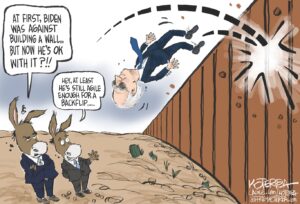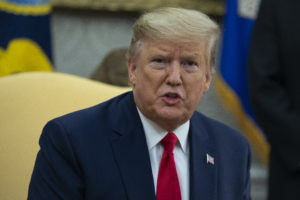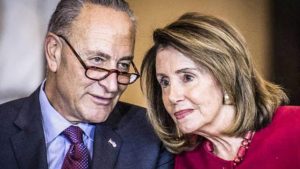GOP Leaders Signal No Taste for Renewing Shutdown Over Wall
Senate Majority Leader Mitch McConnell criticizes the president's confrontational tactics.WASHINGTON — Wary of reigniting a clash that proved damaging to Republicans, congressional GOP leaders signaled Tuesday that they want to de-escalate the battle over President Donald Trump’s border wall and suggested they could be flexible as bargainers seek a bipartisan agreement.
In what seemed a message aimed at the White House, Senate Majority Leader Mitch McConnell criticized the two confrontational tactics that Trump has threatened to employ if negotiators can’t craft a border security accord to his liking. The president has said he’d trigger a fresh shutdown or declare a national emergency on the Southwest boundary, a disputed move that could let him redirect budget funds to building segments of the wall.
The remarks by McConnell, R-Ky., were noteworthy because the guarded lawmaker seldom volunteers his opinions and reporters had not specifically asked him about a shutdown or a possible emergency declaration. The comments underscored his party’s eagerness to put the 35-day partial federal shutdown behind them and avoid additional jarring clashes, and suggested possible divisions between GOP lawmakers and the White House.
“I’m for whatever works that would prevent the level of dysfunction we’ve seen on full display here the last month and also doesn’t bring about a view on the president’s part that he needs to declare a national emergency,” McConnell said when asked to describe a border security agreement he’d support.
House Minority Leader Kevin McCarthy, R-Calif., said he would not insist that any deal include the word “wall.” The comment signaled the GOP’s latest rhetorical retreat from a battle cry — “Build the wall!” — that Trump made a keystone of his presidential campaign.
The longest shutdown ever was initiated by Trump after Democrats refused his demand for $5.7 billion to build segments of his long-sought border wall. Polls show people chiefly blame Trump and Republicans for the shutdown and widely dislike the wall.
The president surrendered last Friday and agreed to reopen government for three weeks so negotiators can seek a border security deal, but with no commitments for wall funds.
House-Senate bargainers plan their first negotiating session Wednesday.
Some lawmakers have suggested broadening whatever package emerges, perhaps adding protections from deportation for young “Dreamer” immigrants in the U.S. illegally or making it harder for future shutdowns to occur. Disagreements over those issues make their inclusion unlikely, most lawmakers say.
McCarthy told reporters Tuesday that the wording of an agreement “could be barrier. It doesn’t have to be a wall.”
Trump has retreated increasingly from “wall” as it became apparent that he lacked the votes in Congress to win taxpayer financing for the project, which he initially said would be financed by Mexico.
“They can name it ‘Peaches,'” Trump said earlier this month. “I don’t care what they name it. But we need money for that barrier.” He’s also recently tweeted a new mantra, “BUILD A WALL & CRIME WILL FALL!”
McCarthy said wall and barrier mean the same thing to him and Trump.
“Inside the meetings we’ve had, he’s said it could be a barrier, it could be a wall,” said McCarthy. “Because what a barrier does, it’s still the same thing. It’s the 30-foot steel slat, that’s a barrier.”
White House spokeswoman Mercedes Schlapp said, “The president has perfectly set this table for the negotiations with Congress. He wants to give Congress one more chance.”
Democrats have repeatedly said they wouldn’t finance the wall, which House Speaker Nancy Pelosi, D-Calif., has called “immoral.” In recent weeks, they’ve expressed support for fencing or physical barriers but have left ambiguous exactly what they would back. They’ve said they want to spend money on more border patrol agents and technology like scanning devices and drones.
“There are many kinds of walls, and so I think that we’re going to try to find common ground,” said No. 3 House Democratic leader James Clyburn of South Carolina.
McConnell and many GOP lawmakers have long sought to avoid government shutdowns, aware of the tactic’s long and consistent history of backfiring badly on whoever sparks one. In the one that just ended, 800,000 federal workers went unpaid for five weeks, countless Americans were denied federal services and mushrooming problems included slowed air travel and delayed IRS refunds.
“There certainly would be no education in the third kick of a mule,” said McConnell, adding an additional kick to the homily he frequently cites about how shutdowns don’t work.
Members of both parties have opposed Trump declaring an emergency on the Mexican border. They say it would set a dangerous precedent for future presidents who might use the strategy to push their own agendas that stall in Congress. If he issued the declaration, it would trigger near-immediate lawsuits that might block the money anyway.
“There’s no appetite for government shutdowns and there’s not much appetite for an emergency declaration. For a lot of reasons, our members are very wary of that,” said No. 2 Senate GOP leader John Thune of South Dakota.
Interviews with numerous Republican lawmakers showed little taste for a new shutdown.
“Most members, whatever faction in the Republican caucus, would be opposed to a shutdown and would do everything they can to work some kind of deal,” said Rep. Mark Walker of North Carolina, a member of House GOP leadership.
___
AP congressional correspondent Lisa Mascaro and reporters Matthew Daly and Jill Colvin contributed.
Your support is crucial…With an uncertain future and a new administration casting doubt on press freedoms, the danger is clear: The truth is at risk.
Now is the time to give. Your tax-deductible support allows us to dig deeper, delivering fearless investigative reporting and analysis that exposes what’s really happening — without compromise.
Stand with our courageous journalists. Donate today to protect a free press, uphold democracy and unearth untold stories.









You need to be a supporter to comment.
There are currently no responses to this article.
Be the first to respond.